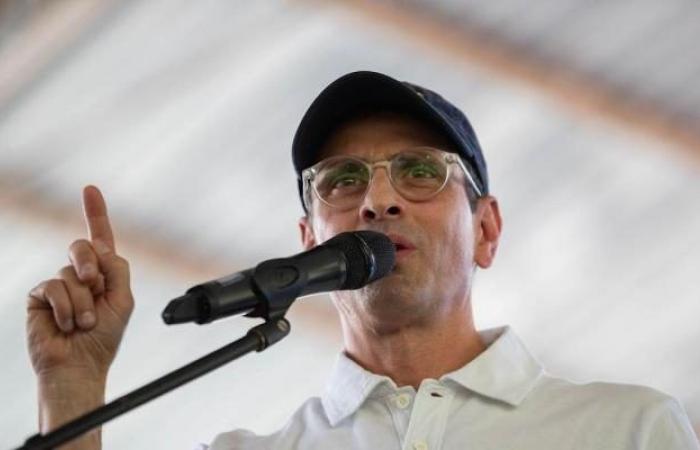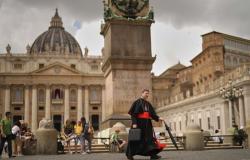Latin American Summary, May 5, 2025.
The authorization of Henrique Capriles Radonski so that he can opt for public offices after eight years puts in the fore, again, two factors that are successively linked: the repeated Loop of abstention versus electoral route and, therefore, the deep division of the political and electoral organizations of the universe of the oppositions.
But perhaps the most important thing among these variables has to do with the national leadership vacuum. María Corina Machado’s disinfle after months of inoperativity and the little ability to impose her abstentionist line on the rest of the factors of the same field left an abyss that returns as a cyclic ghost.
What leads us to ask ourselves: Can anyone fill it?
Divisions and subdivisions
According to Capriles, after his authorization, he will be a candidate for the National Assembly for the May 25 elections. In this way, he ratified Juan Requesens as an aspiring to the governorate of Miranda. Both by new card: union and change.
In mid -February the Democratic Unitary Platform (PEM) demanded “conditions” for electoral participation, including illegal and unconstitutional assumption by Edmundo González Urrutia as “President.”
The approach caused a diatribe between the oppositions since the abstentionist aspect of Machado and González prevailed in front of the inclinations of Capriles and the parties a new time (UNT) and movement by Venezuela (MPV) towards electoral participation.
Thus, some awnings that are part of the “Unit” platform, such as UNT and MPV, made their way to the electoral route, with the possibility that other traditional parties such as first Justice (PJ) and, above all, democratic action (AD) join the caravan, which have electoral cards.
Recently, several leaders have demonstrated in favor of the electoral option:
- Luis Eduardo Martínez
- Antonio Ecarri
- David Uzcátegui
- Manuel Rosales
- Henri Falcón
- Luis Florido
- Jesús “Chúo” Torrealba
- Omar Barboza
The list continues, in dissent with the abstentionist route that marks Machado.
But for this reason, and now with former governor Mirandino as a candidate for deputy, the deep divergence between opposition political tendencies is exposed, even in leadership subdivisions. Because, it also shows that its leaders have a vocation to consolidate their authority in regional contexts.
Preserving the Situation when Propy
Among the oppositions there are regional leaderships, but no national in sight.
We can highlight the figures of Rosales in Zulia and Morel Rodríguez in Nueva Esparta, where they have consolidated their bases in a roots and have deepened the logic of bastion.
Faced with the political-electoral hegemony of the United Socialist Party of Venezuela (PSUV), together with the support of the instances that make up the great patriotic pole Simón Bolívar-signed by a solid unity, first around Chávez and, then, Maduro-, many have tried to cultivate in a state or region to stay in the necessary margins of relevance.
Capriles did it in Miranda, before and after its presidential candidacies that culminated in failures. His instinct of political preservation led him to be directed, after 2012 and 2013, towards a definitive regionalization of his leadership, where he could be kept with some amount in public management – until his disqualification in 2017.
But without a doubt the examples of Rosales and Rodríguez are characteristic of this type of leadership, which is usually affirmed among the oppositions. At the national level, there is none that even has a glimpse of authority, much less driving, among the opposition leaders.
Therefore, there is a remarkable awareness of these politicians to protect the situation when in their own regional domains. The call to vote from the governors to re -election and other leaders has a lot to do with the regionalization policy that distinguishes said candidates.
However, there may be some emerging waiting to capitalize on the next elections with a view to a national horizon, such as Ecarri or Capriles, these from a less influential position than a governance, but that would also put them in a discussion scenario – the legislative forum – active and with public significance in the dynamics of the country.
Perhaps there can move some variables in favor of a scenario that, at least, intends to unify criteria between the oppositions; But for now none of this seems feasible.
Possible game change on the opposition board
Capriles may be willing to apply a game changer (Change of play) Within the political ecosystem of the oppositions, taking into account their expertise in electoral contests, especially regional.
Which could indicate that he tries to consider as an alternative to the abstentionism of extremist factors. In a recent interview he said sharply: “I believe in the path of electoral participation” and “abstention is a mistake.”
In addition, it is the only candidate who is speaking in national terms, of alleged “struggle for democracy”, because “what we are raising is to fight on May 25.” This comes into contradiction with Machado, who recently accused him of “traitor.”
Until now, Capriles’s commitment seems to be aimed at becoming a post -25th of May agglutinating figure, under the projection that abstention will lead Machado to an even more marginal position. From there, it would seek to erect itself as a consensus entity, with articulation capacity, on the ashes of extremist factions, becoming “alternative.”
In another recent interview, the former governor said that “the way of not surrendering is expressing and using your rights.” The disagreement between these positions shows that Capriles is using a polarization speech with María Corina, despite the electoral nature of May 25.
On the other hand, and at the same time, I would try to capitalize on the hand of Requesens the recovery of the lost influence on the Mirandino Bastion. In both directions, both his electoral discourse and his support for his dolphin requesens, is emerging as a kind of “campaign chief”, that is, giving the guidelines and placing pieces of his surroundings in the Venezuelan political scene.
Thus, the calculation of Capriles would then consist of emerging as a figure of post -election authority, playing it all to a good participation in the regional and legislative elections to, subsequently, evidence the failure of Machado. Fall and clean table, a new opposition board, where he rises.
A risky play where everything could go wrong. Very badly. After all, it is Capriles.
Source: Mission Truth






